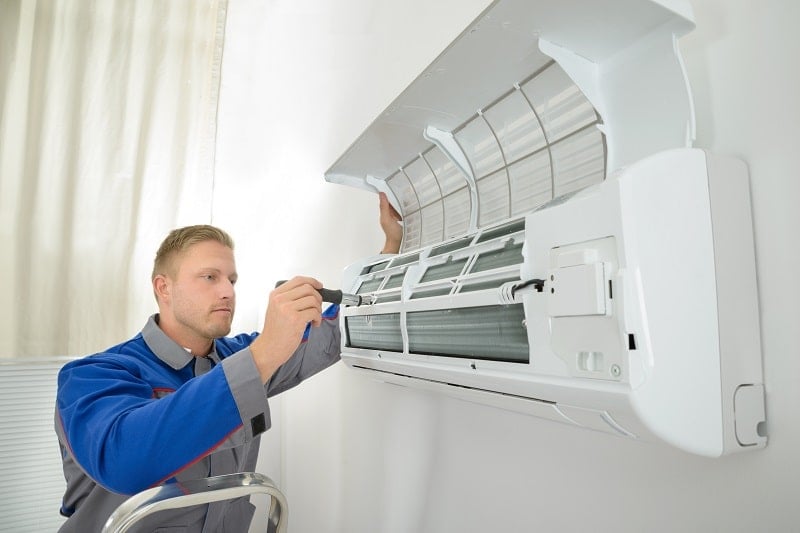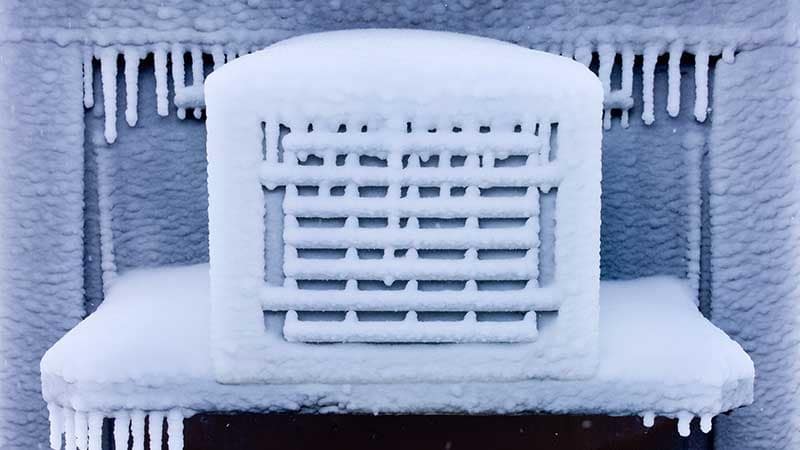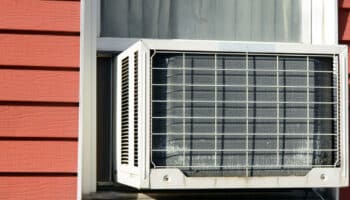It’s a nightmare scenario for summertime.
You get home after a hot day out and you want nothing more than to enjoy the cool breeze from your AC. But after setting the thermostat and waiting, the air coming out of the vents feels no colder than that from a fan! Weirder still, when you check your air conditioner, you find out that it’s got a buildup of ice.
How is it so cold while your house is so warm?
Don’t worry. A frozen air conditioner is often an easy fix. In short:
Turn off the thermostat and set the fan to blow in order to melt the ice. This will help prevent any damage. While it’s off, you’ll want to check the filters and the drainage for problems and give it a good cleaning.
Read on and let’s get that AC working again!
Step One: Turn off the Thermostat and Turn on the Fan
The rule with most appliances is that when they aren’t working right, don’t keep running them.
It’s the same with your air conditioner.
Even though you might be aching for that cold air, it’s not coming until you figure out what’s wrong. The first step to finding out is turning off the thermostat. Whatever is going wrong, it will keep going wrong as long as you run the machine.
The ice buildup itself isn’t the cause of your problem, but it can become one if it gets too big. By turning on the air conditioner’s fan, you keep air flowing past it. Just like how blowing on soup helps it cool down towards room temperature, this air blowing over the ice will help warm it up.
This process will take a few hours if there’s only a little bit of ice. A more extreme case can take up to 24 hours, depending on ambient temperatures. Break out that box fan while you wait.
Some sources advise that you can speed up this process by using a hair dryer to apply some extra heat.
Heating up your icy air conditioner coils is a bad idea that can cost you money.
Your metal coils get a little bit bigger when they get hotter. This is why running a metal jar lid under hot water can help you get it off. However, when they’re surrounded in ice, part of the coil will be shrunken down while part tries to expand. These forces can cause them to crack, which could lead to a nasty refrigerant leak. Just be patient and the ice will melt.
Step Two: Pay Attention to Drainage
Assuming you can access the indoor portion of your unit, you’ll want to pay attention to where all that water goes. Check your condensate pan and make sure the water is draining properly. If something prevents the water from draining out, you could be risking serious water damage to your house. You can easily tell if there’s been a problem. If there’s water on the floor under the unit, it hasn’t drained.
Put down some towels before checking so that any water will be dealt with. Ideally, you’ll see water has been draining from the pan down the condensate drain, usually a PVC pipe. It is possible for there to be a clog in this pipe, which happens if debris manages to make its way into it. A clogged condensate drain backs up water, risking both water damage and freezing. If the pipe is clogged, you may have found the source of your problem!
Step Three: Check Your Filter
There’s a reason we place changing your filter so high on our list of how to get the most out of your air conditioner.
Not only is it important to keep the air conditioner at its maximum efficiency, but if a filter is clogged, it can lead to a number of problems, including freezing. A clogged filter is the most common cause of air conditioner freezing. It doesn’t take much to clog it either. Even a thin layer of dust can reduce efficiency and put you at risk of freezing. It is recommended to change your air conditioner’s filters as frequently as every six months, depending on use and environment.
Unlike many air conditioning maintenance and repair tasks, this is one you can do yourself. If you can’t see light well through your filter, it’s time to replace it. Check first to see if it’s reusable. If it is, first vacuum off major dirt and dust, and then run warm water over it.
Let it dry completely before putting it back.
If you need to get a new filter, double and triple check the size of the filter your need to get and pay close attention to the arrows showing you which way to put it in. It’s that simple!
Step Four: Clean Those Coils!

Once the ice is melted away, take a moment and go over your evaporator coils with a clean rag. Get off all the clinging water. Moist coils can start off a new iceberg if they get too cold again. While you’re in there, wipe away any debris you find. If it’s dusty, this might be a job for the vacuum cleaner and a hose attachment. While an unlikely culprit, this dust bunny empire can lower the unit’s efficiency a surprising amount!
Step Five: Fire It Up
If you’ve replaced your filter or unclogged your drainage pipe, it’s time to try your air conditioner out again! Turn it on and pay attention to what happens. If no cold air comes out even though you changed the filter, you might have a more serious problem.
Read below to see what to do next.
If everything seems normal, though, congratulations! You probably fixed the problem and prevented a multi-thousand dollar compressor repair bill (it can be cheaper to just replace the unit). Watch carefully for a week or two to make sure the ice doesn’t come back. If the air conditioner just starts freezing up again, it’s time to take the next step:
Still Freezing? Time to Call an Expert
There’s a lot of problems that can cause freezing that we can deal with on our own, but when freezing is persistent, it’s time to call a certified technician.
There’s a chance that the problem is just mechanical failure, which a technician can diagnose. If changing the filter and checking the drainage didn’t stop the air conditioner from freezing up, you might have a dangerous refrigerant leak. The refrigerant is the gas used by the air conditioner to cool down the air. This is what people are talking about when they refer to Freon, which is a brand of refrigerant. If you want more details on common refrigerants, click here.
Like the other possible causes of ice on your air conditioner, a refrigerant leak can lead to a very expensive repair if it isn’t quickly fixed, but unlike the others, it’s extremely dangerous to do so yourself. It is also illegal. Call a technician right away if you think you might have a refrigerant leak. The gas is extremely toxic to both the environment and your health, but the sooner you catch it, the healthier you’ll be and the less you’ll spend.
Preventing a Frozen Air Conditioner
Just like for so many other problems, an ounce of prevention is worth a pound of cure. Though air conditioners are built to last for years, just like you they should get a yearly inspection. The best time for this is in spring, before you need to start using it regularly in the summer heat.
See if your local companies offer comprehensive maintenance packages. These can make sure your filters are functioning, find leaks, check your coils, and look into all the more complicated machinery. They can even catch refrigerant leaks before ice begins to form simply by checking to see if the levels are still high! You can of course do the maintenance work yourself, but if you find any major problems, call the professionals.
Conclusion
A frozen air conditioner is a common issue, and if you tend to it fast enough, usually a relatively cheap and easy fix. Often, it just requires a filter change or a clearing of its drainage pipe. The most important thing is to stop using the machine while it’s frozen, and to keep an eye out for any refreezing after you’ve tried these fixes. Even if you end up having to call a professional, the fact that you caught it early will save you money and lengthen your air conditioner’s life.
If this article was helpful, check out our other articles on air conditioners. Thanks for reading, and keep cool (but not frozen!) this summer!









